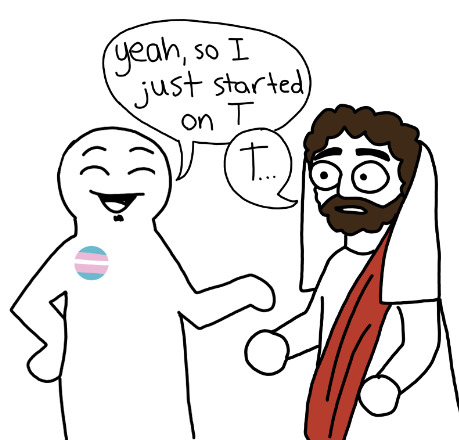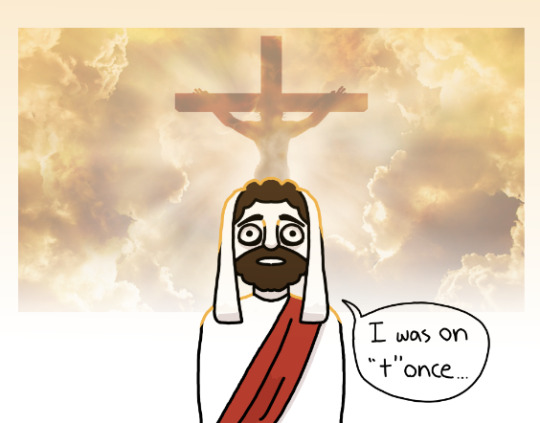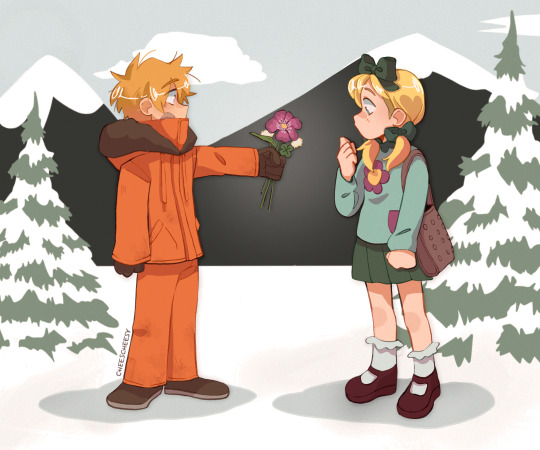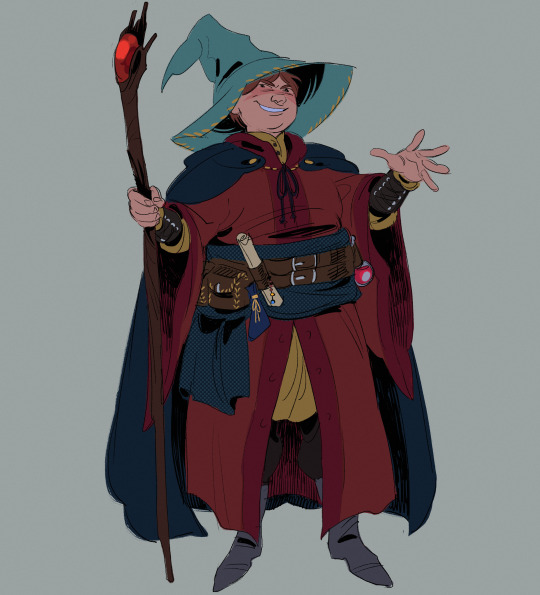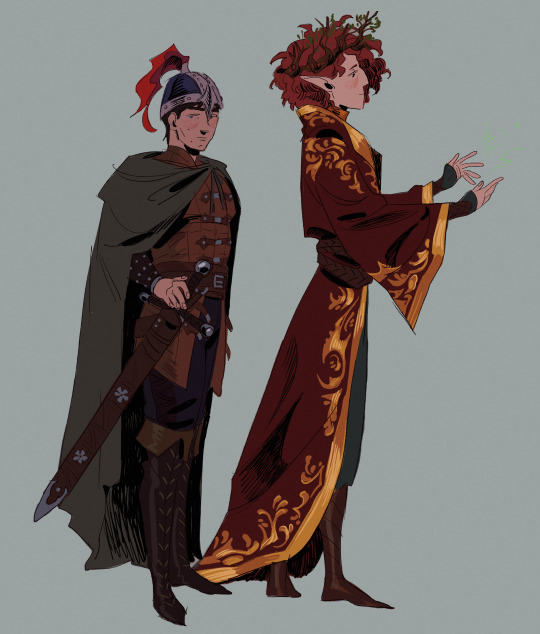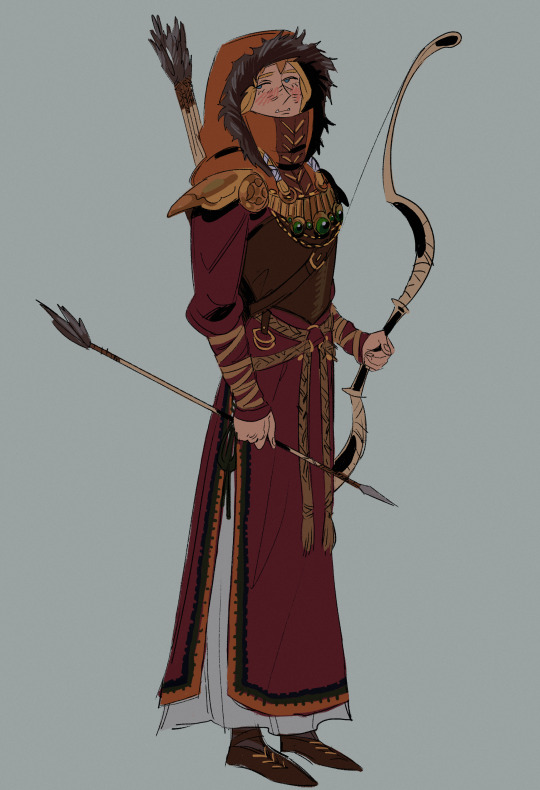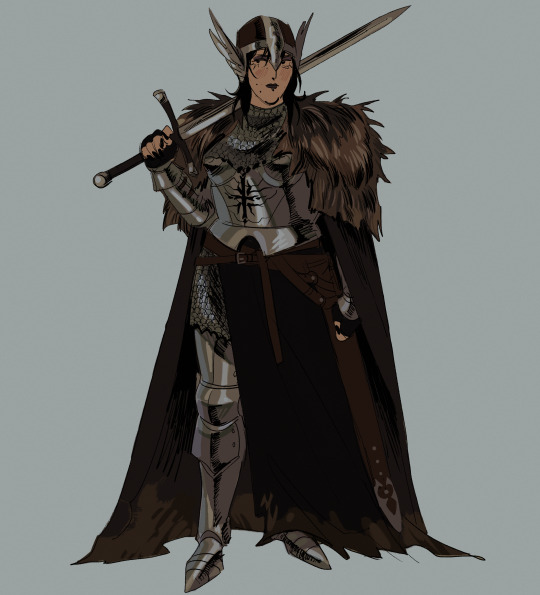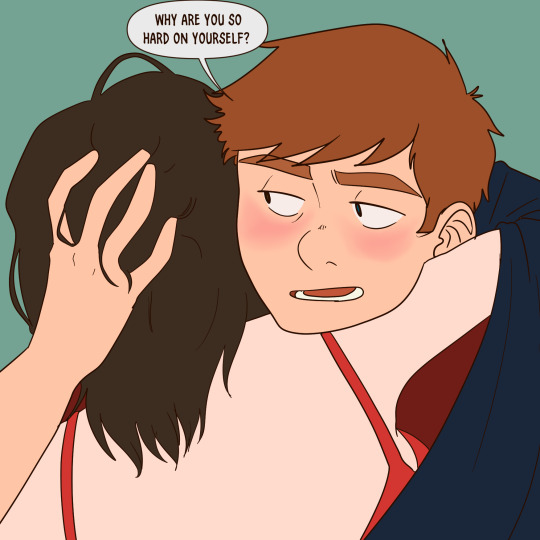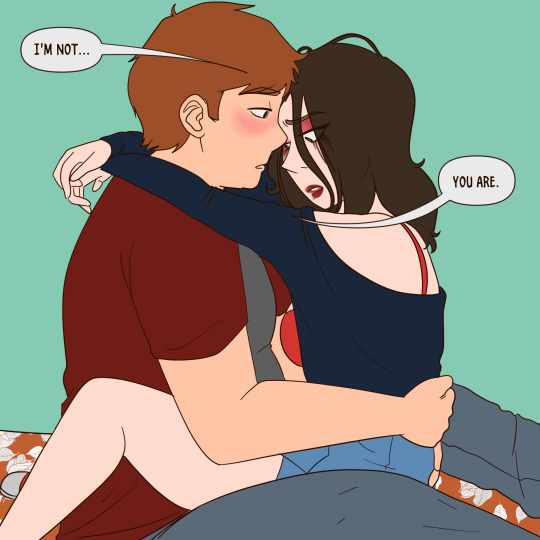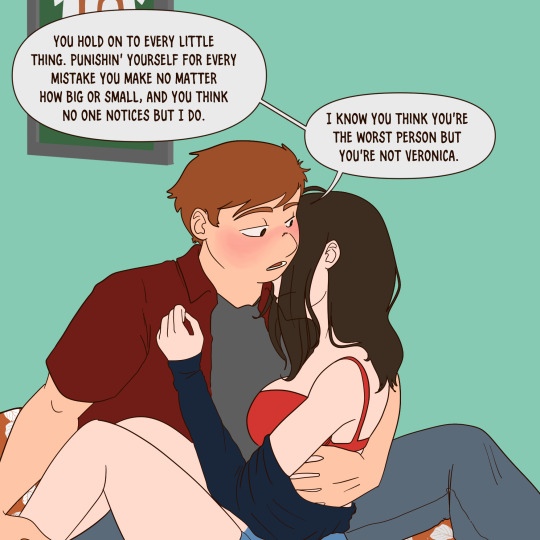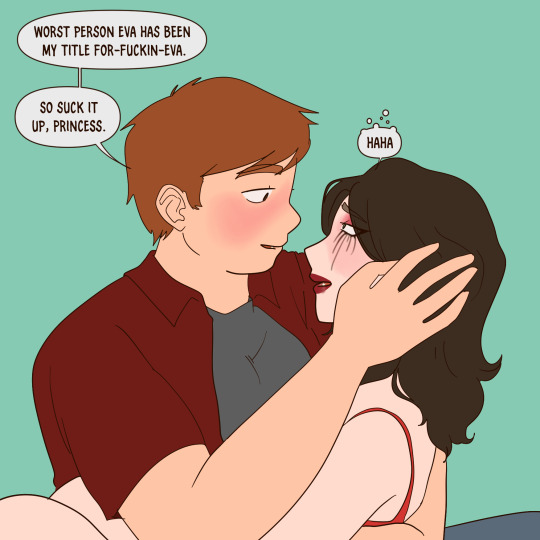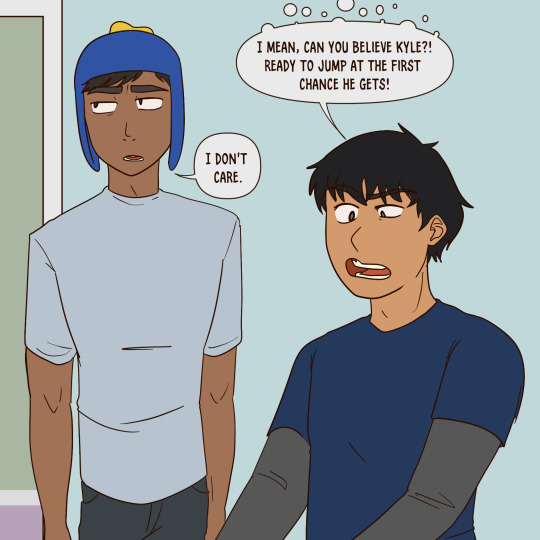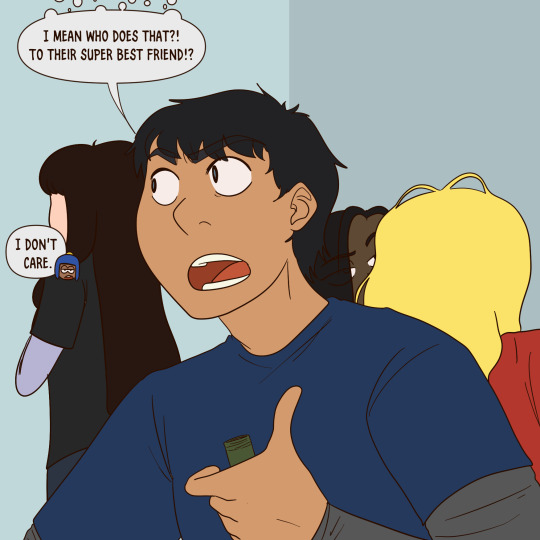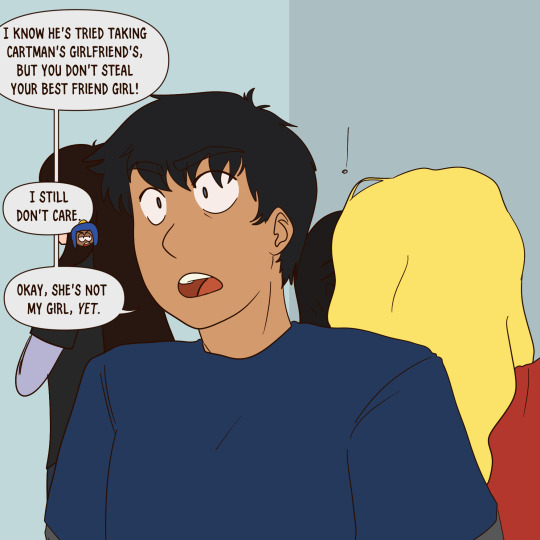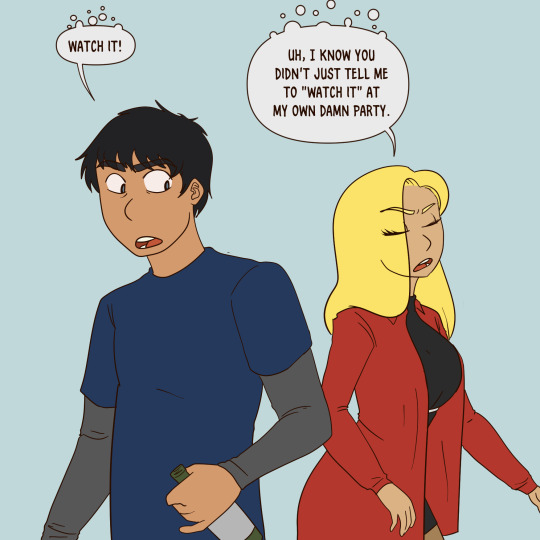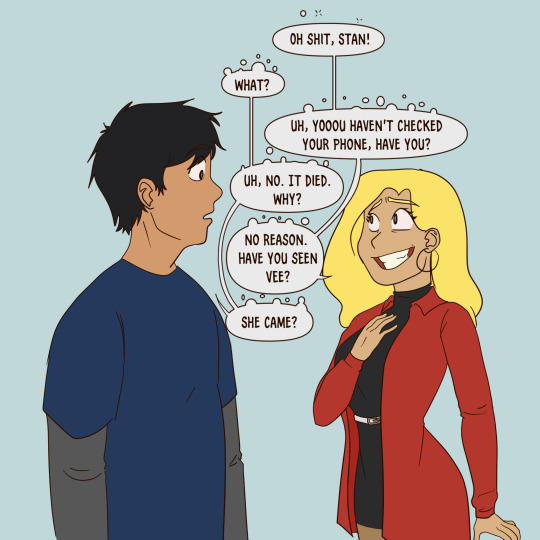Text

when i dont know enough in an area of my special interest
32K notes
·
View notes
Text

One of these fellas is my name.
Look up your name in the gifs and show the first gif that comes up

@absurdumsid @inka-boi @childofthest4rzz @tobi-draws @largefound
2K notes
·
View notes
Text
whenever they get really pissed at each other and want to be left alone Ragatha lines up a bunch of corn in front of her door and Jax lines up a bunch of centipedes in front of his like they’re warding off demons with ritual salt
399 notes
·
View notes
Text
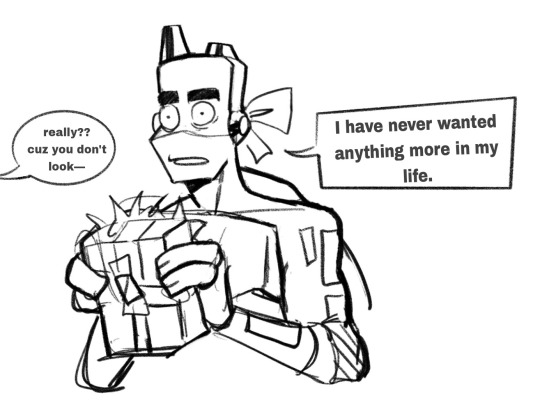
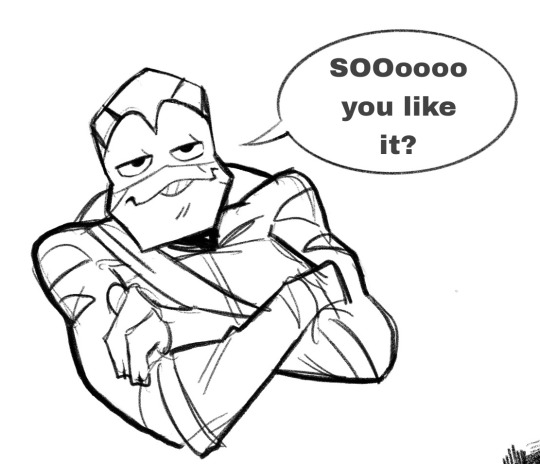
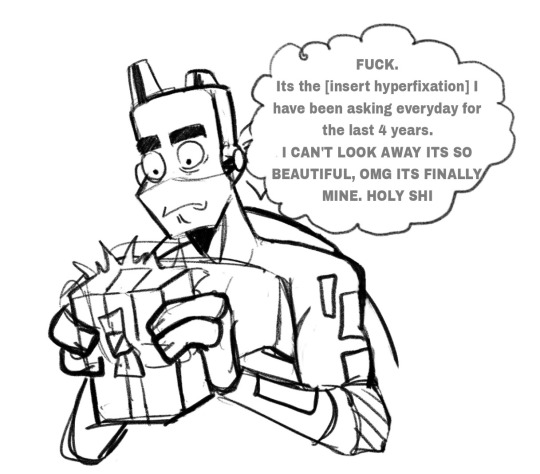
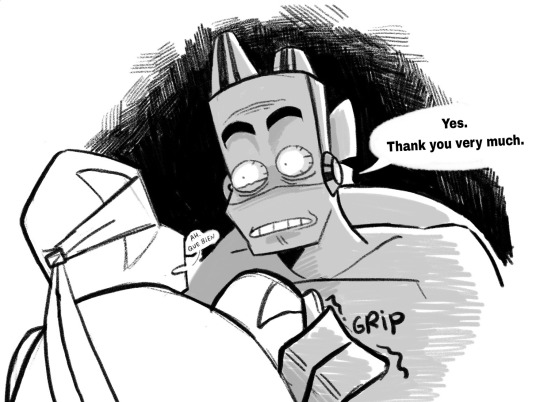
This old comic about personal experience with gifts. Idk brain just malfunctions when I have to show emotions and I thought that Donnie could relate?
8K notes
·
View notes
Text
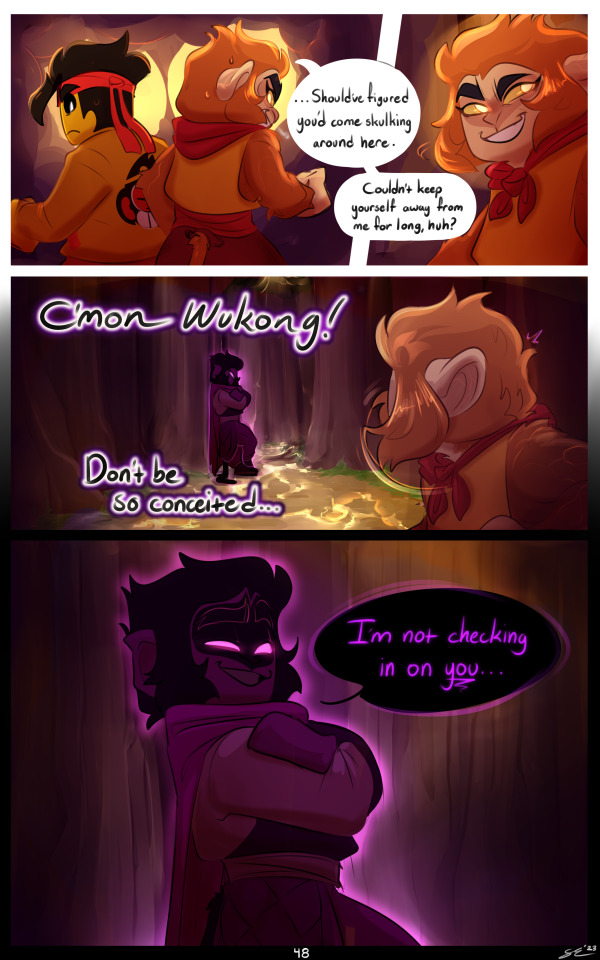
Chapter 1: Regroup and Rebound Page 48
Why won't it go away?
Start|| Previous || Next
1K notes
·
View notes
Text
The myth of Sumire and Hakubo: JSHK chapter 94 and the reinterpretation of “Tales of Ise: Part 6 (Akutagawa)”
Hakubo and Sumire seem to be a point of controversy and confusion among the jshk fandom: from their introduction to the latest chapters, they are a misunderstood and underrated pair, a phenomenon that has only exploded as of chapter 94.
There are many factors, as I see it, that contribute to this... confusion. But in this post, I'll focus on an aspect that is so far, very overlooked, but in my opinion, very important in understanding Hakubo and Sumire: their relationship with the mythical and mundane.
For that, I'll also be comparing chapter 94 with part 6 of the Tales of Ise (Akutagawa).
But before we begin this analysis, I feel we must clear a few concepts.
1. Clearing concepts: Eating and Sex, Death and Marriage
It feels like I'm pointing out the obvious, but just to be safe, let's talk a bit about these metaphors, not only what they generally mean in literature, but how Aidairo apply those metaphors in JSHK.
a) Eating = sex
This… should be the most obvious one. It’s really not that uncommon to see this particular metaphor in… any sort of media whatsoever! Poems, songs, books, movies, series… Maybe you’ve heard instances in literature of wanting to devour someone equating to sexual desire. Or think of vampires, these monsters now synonymous in pop culture to sexual beings, their lust for blood often intertwined with sexual lust. Heck, even stories that come from oral tradition, such as Little Red Riding Hood, have many interpretations that equal the wolf’s eating of the girl to sex.
Still, even without this knowledge, Aidairo does establish plenty of times, both in their AUs and the manga proper, what eating- particularly someone else- can mean within their writing.
Let’s start with the AUs:
In Hanako-kun of Magic: Sweet Witch Banquet, the only way Nene and Aoi can bring back the people they turned into sweets back to normal is to eat them… with the side effect that, for a short amount of time, the people who were eaten will fall in love with those who ate them.
In the Ghost Hotel AU, it’s a little more subtle but it’s still there. There are two instances of monsters eating those they desire. First, there’s Kou, who’s a werewolf in this AU, and apparently can’t resist taking chunks out of Mitsuba the mummy to cook and eat.
Second, there’s Hanako, who’s a vampire in this AU, and who’s stated to have drunk too much blood out of Tsukasa, and later, is implied to bite Nene and do the same to her, trapping her with him in the hotel.
But AUs are not the only place Aidairo have written this metaphor. In the very first chapter, eating a mermaid’s scale together means you’re bound to each other, a bond equated in said chapter to a romantic relationship.
And if that example’s too much of a stretch for you, than look no further than chapter 39: Mokke of the Dead!
In that chapter we have two instances of eating equating to sex and romance. First, when kegare!Hanako going straight to Nene to eat her. The scene is…
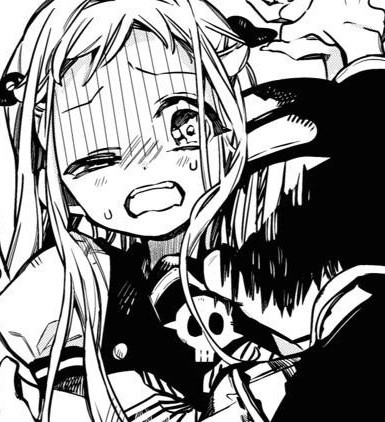
…quite suggestive, Nene even misinterpreted it at first!
Later, we have Akane who, under the influence of kegare, seemingly translates his romantic feelings for Aoi into wanting to eat her.
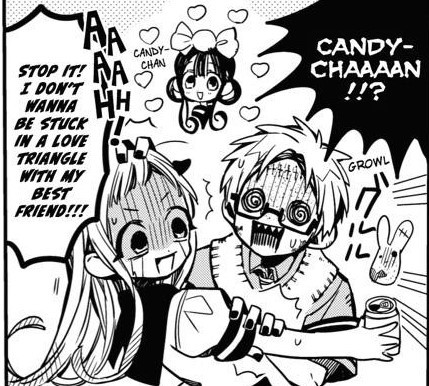
It’s very clear here that Akane’s thinking of Aoi when trying to take a bite out of Nene. Hilariously, Nene herself worries that Akane trying to eat her would result into a love triangle between her, Aoi and Akane.
And last but not least…
THESE PANELS ARE CLEARLY BEING FRAMED AS A SEX SCENE!!
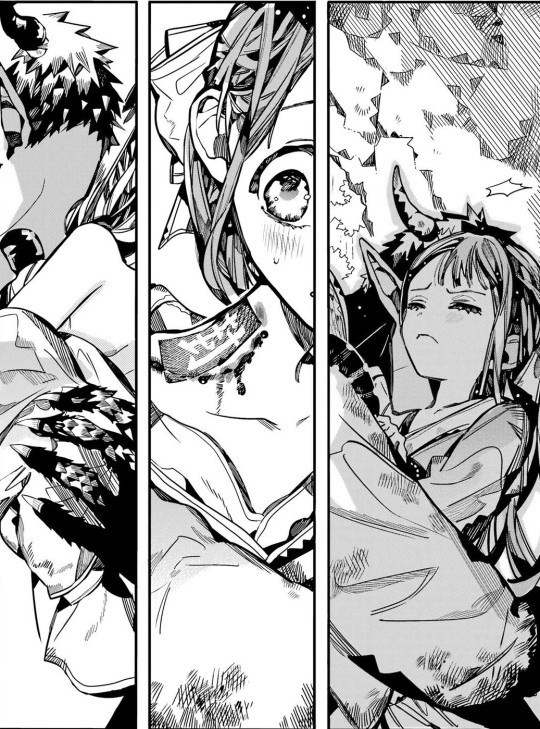
Seriously, how could anyone not see it?
So, yeah, JSHK clearly uses the cannibalism = romance and sex metaphor a lot. But what about death and marriage?
Let’s find out:
b) Death and Marriage
For this one we must turn back in time and go for stories based on oral tradition.
Death and the Maiden is a very famous, frequently used motif in stories. Most iterations of Beauty and Beast use both Death and the Maiden and Animal Bridegrooms in their narratives to make a point.
But basically, death and marriage have been equated in stories for a very long time, to symbolize the cyclical nature of a human’s life- in this case, it often has to do with the end of a woman’s childhood and the start of a new part of her life, as a wife and mother: adulthood, basically.
Think of Hades and Persephone, who are meant to symbolize the cyclical nature of life and death, the coming and going of the seasons and marriage as the end of childhood/maindenhood, but the beggining of something new.
In JSHK, this is also referenced with the Kannagis, usually young women of marriageable age, whose sacrifice is equated to marrying God and returning to his side.
Keep all of this in mind as I ask you: which of the mysteries oversees 'life and death'? Who, in the JSHK universe, is meant to be seen as the main representative of Death? And what character is mostly seen among flowers? What characters are heavily associated with the dual nature of Life and Death?
Hint: it's Hakubo and Sumire.
As No. 6, Hakubo has powers over life and death. Currently, he’s also referred to as a Shinigami, often translated as a “Grim Reaper” or “God of Death”. The term “shinigami” can also have, in literature, a link to suicides and shinjuu. Finally, he’s an Oni. In many stories, often written during/after wars, famines and natural disasters, Oni are featured eating people- in these, Oni are a metaphor for death itself.
So, if we consider Hakubo’s role as a Death deity in the JSHK mythos, we have to ask this question: what happens when Death falls in love?
2.) Chapter 94: The reinterpretation of Tales of Ise Part 6 (Akutagawa)
The 'Tales of Ise' is a uta monogatari (essentially, a collection of poems and other narratives) composed of more than 100 episodes, some of which date back all the way to the Heian period.
Among those poems, there is one in particular Aidairo chose to allude to and reinterpret in their manga: Episode 6 (Akutagawa). The story below (translated by Helen McCulough) shares certain beats with chapter 94:
A certain man had for years courted a most inaccesssible lady. One pitch-black night he finally spirited her out of her apartments and ran off with her. As they passed a stream called the Akutagawa, She caught a glimpse of a dewdrop on a blade of grass and asked him what it was.
The journey ahead was long, the hour had grown late, and a torrential rain was pouring down, punctuated with frightful peals of thunder. The man put the lady inside a ruined storehouse and stationed himself in the doorway wiht his bow and quiver on his back, never dreaming that the place was haunted by demons. But while he was standing there longing for daybreak, a demon ate the lady up in one gulp. A thundercap muffled her scream of terror.
When the sky finally began to lighten a bit, the man peered inside and saw that the lady was gone. Frantic with helpless grief, he recited,
When my beloved asked,
"Is it a clear gem
Or what might it be?"
Would that I replied,
"A dewdrop!" and perished.
There are quite a few beats that match, no? A couple that isn’t allowed to be together is stranded by the rain, but it ends unexpectedly as the woman is eaten by an oni.
Now, before any of you look at this superficially, have a "gotcha!" kind of reaction and try to use it as proof that Hakubo didn't love Sumire or that Sumire was eaten against her will, let me reiterate that not only chapter 94 is a reinterpretation of this tale, but also that Aidairo has done this sort of thing before.
Aidairo loves to reference all kinds of stories in JSHK. The 'Little Mermaid' is thematically very important to Nene's character, part of the short story 'Takasebune' is narrated by Amane during the Picture Perfect arc, the myth of 'Orpheus and Eurydice' is alluded to twice, first with Akane and Aoi, then with little Tsukasa, Nene and Kou.
Most obviously, we also have the urban legend of 'Hanako-san' right in the first chapter.
What do all these instances have in common? The answer is simple: they all are reinterpretations of the original tales.
For example: both with Akane and Aoi, and the trio of Nene, Kou and little Tsukasa, we have an allusion to the famous scene of Orpheus looking back to see Eurydice, only to find her gone.
The differences in these interpretations lie on many factors, but most heavily on the characters taking the role of ‘Eurydice’. Although she was essentially kidnapped, Aoi still was passively suicidal, and later even lashed out at Akane and Nene, who were trying to rescue her. Likewise, Tsukasa actually knew the way to get back to his family, he only chose not to until Kou and Nene convinced him to do otherwise.
By giving Aoi and Tsukasa more agency than the character of ‘Eurydice’ had in some known versions, this allows for a more complex and nuanced narrative without taking the tragic elements out of it. That said, to outsiders, these situations might look like a version of ‘Orpheus and Eurydice’ played completely straight: a tragedy about a poor, helpless thing taken too soon against their will, not particularly nuanced nor too complex.
Chapter 94, similarly, transforms the chapter of Akutagawa into a more complex and nuanced story by giving both Hakubo and Sumire more agency, even if, to outsiders, it might look like it was just the tragic tale of a poor innocent girl being trapped and eaten by a monster.
And this where we can see the differences between the two stories.
The woman in the chapter ‘Akutagawa’ is a tragic figure… but her voice can barely be heard anywhere in the narrative. The only things we know about her are that: one, she was implied to be of a much higher status than the man, and two, that she was apparently so sheltered and isolated, she’d never seen a dewdrop before in her life. The man mourns not explaining to her what a dewdrop was.
Sumire was, indeed, from a family of much higher status than Hakubo, who was essentially a slave to the Minamoto clan and their village. Sumire was also, very sheltered and isolated throughout her entire life.
But Sumire’s status within the village was simultaneously very similar to Hakubo’s own: she was nothing but an object to be sacrificed, mostly referred as a Kannagi by her fellow humans. And although she was sheltered and isolated, Sumire hilariously began her relationship with Hakubo as the one with more basic living skills (cooking, laundry, cleaning).
Sumire, most importantly, knew Hakubo was an oni from the very beginning, and again and again proclaimed her love for him, knowing very well what, who and how he is.
While Sumire is meant to represent the woman in the tale, Hakubo is meant to be both the man eloping with the woman he loves and the oni who eats her.
Hakubo, like the man in ‘Akutagawa’, pines for a woman he cannot be with: not as kaii who loves a human, not as the one in charge of seeing her off as a Kannagi. Hakubo had wished to take Sumire’s hand and run away from their village, to ‘spirit her away’ much like the eloping couple did. And ultimately, so they would not be separated again, Hakubo eats Sumire, as the oni ate the woman.
It’s very poignant, I think, that Hakubo represents both the man and the oni from ‘Akutagawa’. The entire irony of his monologue in chapter 94 lies in the fact that he didn’t need to be a human man to do any of those things: he managed, in his own way, to do them all.
He laments not being able to cry for Sumire, while his face has been permanently marked, two thin tears streaks forever burned in his visage.
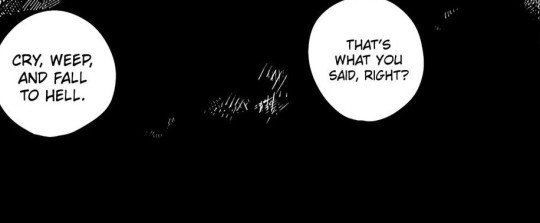
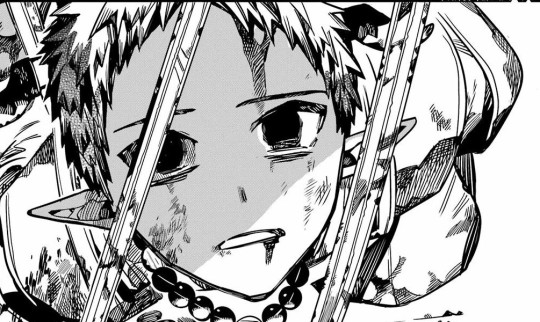
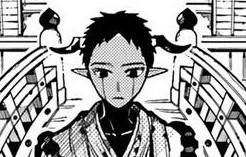
He wishes he could’ve grown with her, and yet, did he not grow? Learning with and from her, how to take care of himself and her, discovering and developing feelings and desires buried deep within him? Does he not seem older, comparing before and after he met Sumire, physically, mentally, emotionally?
He says he wished he could’ve laughed with her too, dismissing how, moments ago, he was actually smiling and playful, the happiest we’ve ever seen him be as he recalls precious memories with Sumire.
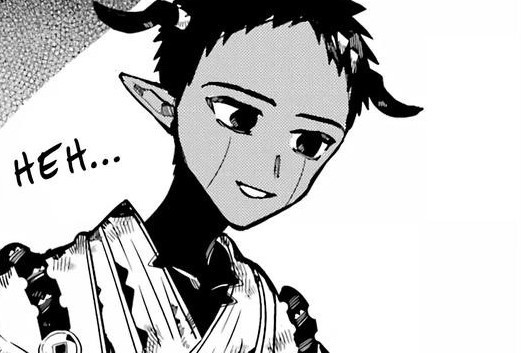
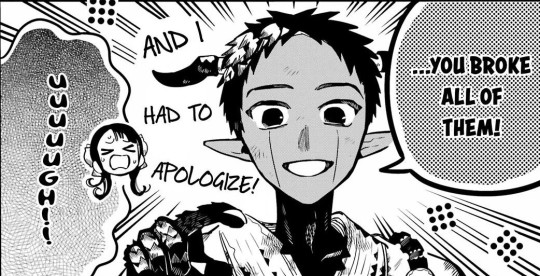
‘I would’ve clung to you and cried as you were sacrificed’ he says as his boundary itself weeps, trapping her in a cave with him, as if begging her not to leave him again.
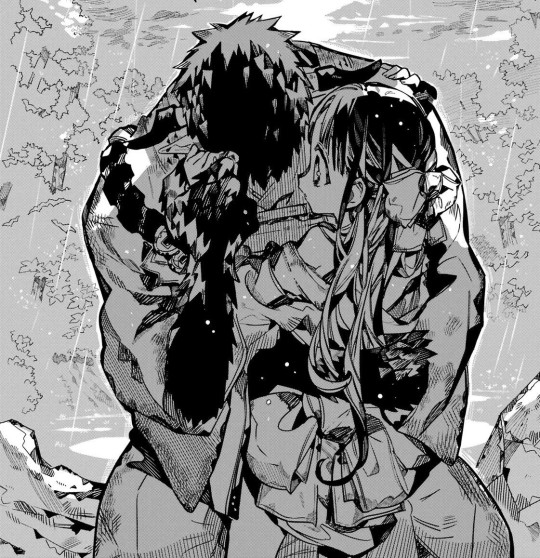
…‘I would even have fallen in love with you like a human man would’ he confesses, as he devours her, usurping the River God of the village as her husband, after kissing her like a man starved, after confessing to be under her spell.
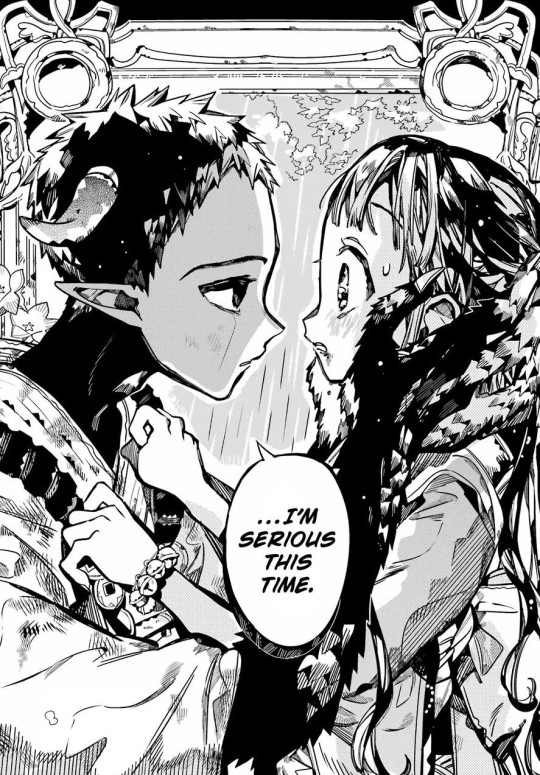
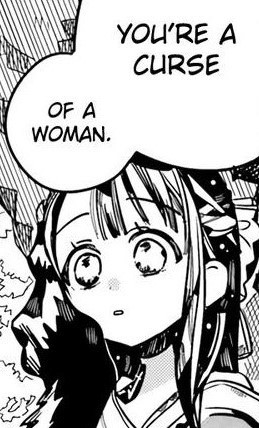
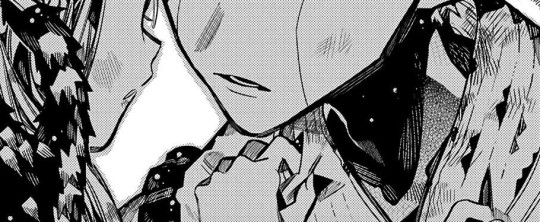
Hakubo represents both man and oni because he was both, because, in JSHK, kaii and human truly aren’t all that different.
…Hakubo is also the woman, ignorant of his own heart, as she was of the world outside.
Sumire is also the man and the oni, at once guiding and haunting Hakubo.
The reinterpretation of ‘Akutagawa’ in chapter 94 is not meant to lend a cynical view on Hakubo and Sumire’s relationship and feelings for each other.
Instead, it is meant not only to reinforce that they loved each other, but also finally get some agency, after a lifetime of abiding to their village’s will.
It is also important to note that chapter 94 is, in many ways, a do-over of chapter’s 89 ending for both Sumire and Hakubo.
Once again, they’re placed in a situation where a higher power dictates that Sumire must be sacrificed and that Hakubo shall oversee said sacrifice. Sumire even says:
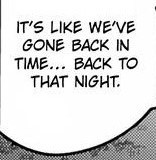
Both Hakubo and Sumire had many regrets about that day. Feelings unspoken, the sin of inaction… the loop present in their boundary symbolizes how neither ever moved on from that night, from their regrets.
When faced with the same situation once again in chapter 94, Hakubo and Sumire decided to take their fates into their own hands, with the cards they were dealt. Unlike their past selves, and unlike the man and the woman in ‘Akutagawa’, Hakubo and Sumire at last gained some agency.
It isn’t a tragic ending, although I don’t see it as truly happy either. Like many things in their lives, it was bittersweet.
3.) Nature vs Nurture: the significance of the rumors and the “right way” to love someone
I've seen some people completely miss the point and think that Hakubo's nature as an Oni means he's incapable of loving someone. The same people also completely ignore the sort of environment he grew up in.
First, and as a quick note, I find this panel very interesting:
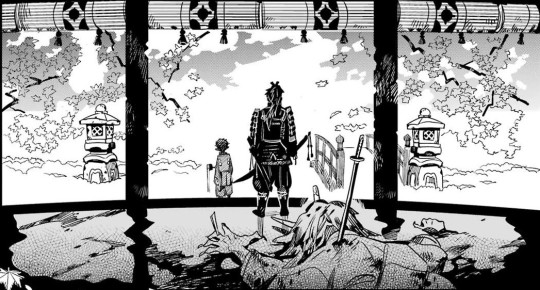
It has struck with me for quite some time now, Shuten Doji’s pose. It looks like he was reaching in Hakubo’s direction, almost as if to warn him or protect him. How odd if you think that Oni apparently aren’t capable of love.
But regardless of nature and what love might innately mean to an Oni, we should also take a look at Hakubo’s formative years:
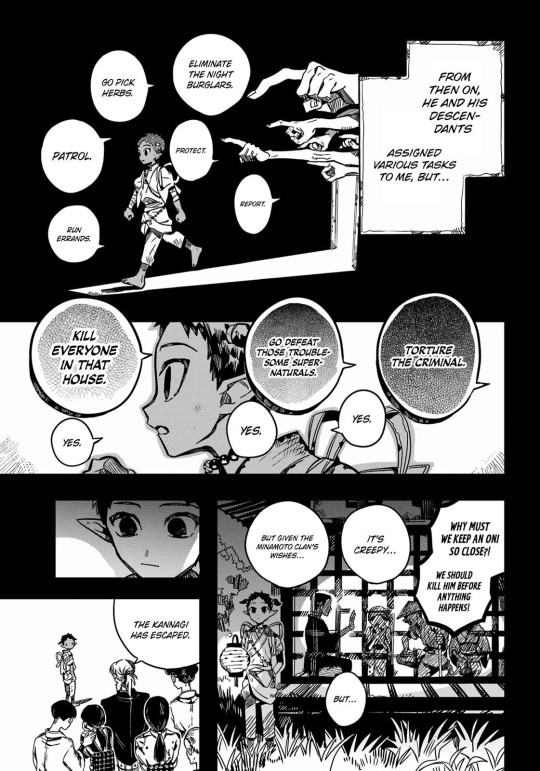
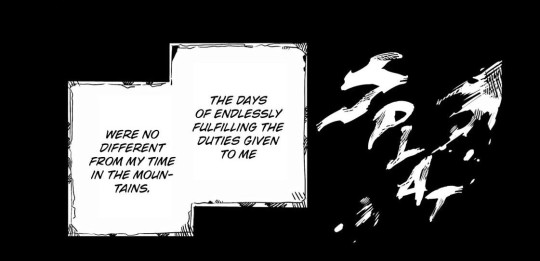
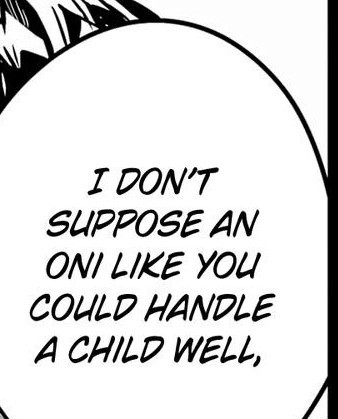

A slave, a tool to be used, Hakubo not only equates the humans to the mountain Onis, he also grows up hearing again and again that he’s a monster incapable of understanding humans, that he’s different, he’s unfeeling.
How the hell was that not supposed to affect how Hakubo viewed himself?
(something, something, call someone monster enough times, and they'll actually become one)
The manga never really discards either nature and nurture when it comes to their characters, and with Hakubo, it is both his dense nature and his alienating non-upbringing that turns him into the mess he is.
By the way, we’re absolutely meant to compare the villagers talking about Hakubo to the students spreading rumors. The way they call him creepy, the panel where only the hands of the villagers are shown... it kinda reminds me of Shijima-san's flashback.
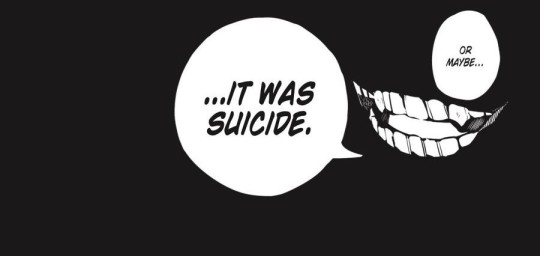
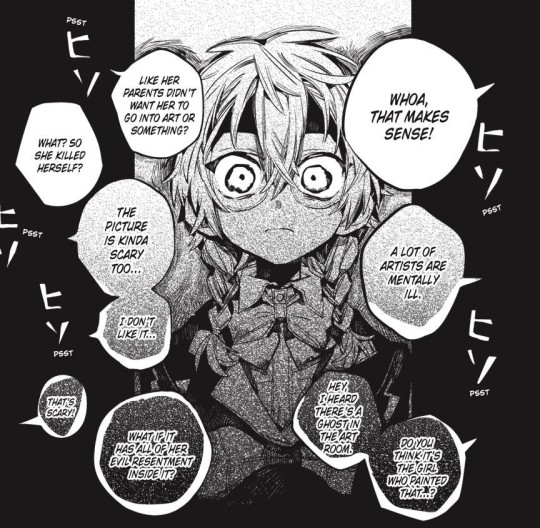
This last image also low-key reminds me of the scene where the villagers are celebrating Sumire's death. I think Akane's steadyfast belief that kaii don't value life and his implict belief that humans value it will be put in question by either or both Shijima and Hakubo. But that's a whole other thing.
And just in case you missed, here’s a little montage of humans and supernaturals being compared:
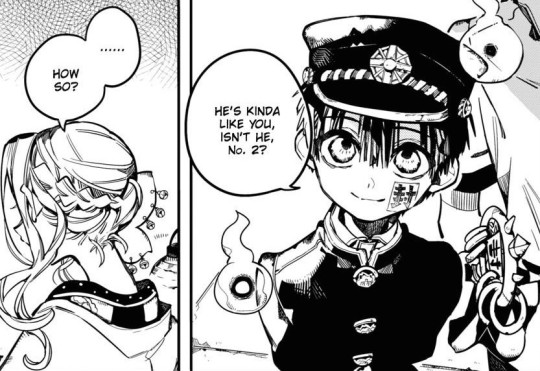
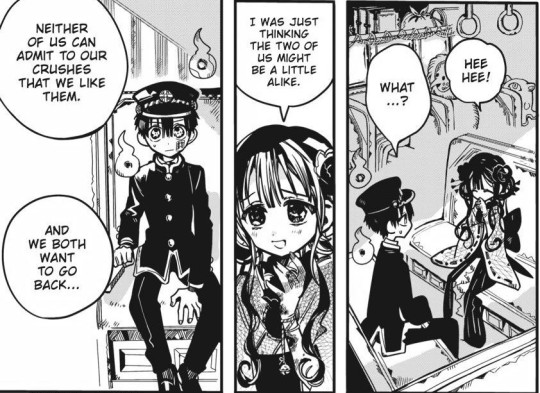
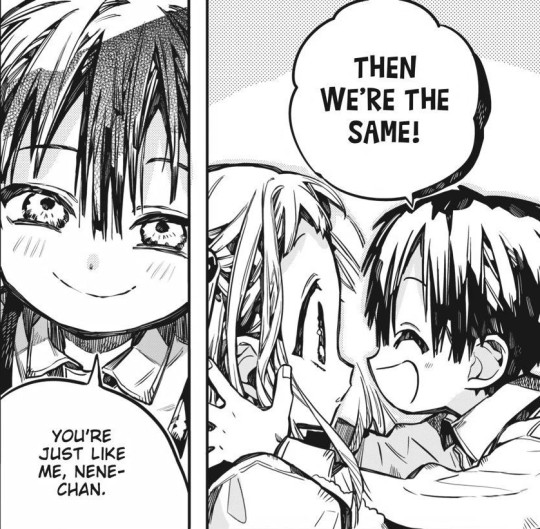
Kou is ‘kinda like’ Yako, Aoi and Hanako 'might be alike’, Nene and Tsukasa are the same.
Humans and supernaturals are compared so many times in this manga, and every single time we see that they’re not really that different. All of them have someone they love- all of them.
Considering this, I must ask: just what is “truly loving someone” in the world of JSHK? What is the “right” way to love someone in the manga, presented by the text?
And just which characters have managed to love someone the “right” way?
Is it Yako, who has tried to bring Misaki back in the shadiest way possible, by harming students and building a fake body?
Is it Tsuchigomori, who never put anything in line to help Amane?
Is it Shijima, who tried to kill Mei?
Is it Akane, who stalks Aoi, constantly changes himself for her and beats up her admirers? Is it Aoi, who has stabbed him, and simultaneously kept him at arms length and lead him on for years?
Is it Natsuhiko, who tried to drug Sakura and is okay with her destroying humanity as long as he gets a date? Is it Sakura, who is cold and violent towards Natsuhiko, while not letting him go?
Is it Kou, who calls Mitsuba a ‘fake’, tries to commit suicide to appease his guilt, and is a low-key bully to him? Is it Mitsuba, who kidnapped Kou and wants Kou to accept him just because he’s lonely?
Is it Teru, who tortured Akane on a daily basis and tries to control Kou’s life?
Is it Nene, who fell for the first boy who gave her attention, can be frivolous and shallow when it comes to romance and is always making excuses for Hanako?
Is it Tsukasa, who’s love-starved, obsessed and willing to destroy and manipulate everything and everyone to make Hanako happy?
Is it freaking Hanako, who killed Tsukasa, who tried to imprison Nene and who is creepily possessive of both?
…Is it Sumire, who wished to a submissive, obedient Oni to fall into hell for her and was blissfully happy when she found out he did just that?
...Is it Hakubo, who cannot express or understand himself clearly, and struggles with his feelings just like any other character in this manga?
If you’ve read any of those and tried to justify something, or if your gut reaction was “well, it’s more complicated than that…”, or if you thought that this doesn’t mean the feelings of love weren’t there, even if warped or twisted…
Then, congrats, you got it!
Pretty much no character has a truly healthy idea of love in the manga- all the romances… all the main relationships so far have been at least a little bit messed up.
But something JSHK has not done so far is put any of its couples in the “failed romance/not true love” box. It has played with concepts of selfishness vs. selflessness, yes, but it has never disregarded the feelings of those involved as not love.
The only time I remember that Aidairo explicitly told the audience that something wasn’t love was through Nene in the very first chapter… when she admitted she didn’t know anything about her old senpai or Teru, nor did she bother getting to know them.
This is a manga about people who are on the way to discovering themselves and who have no idea how to communicate nor express love in a healthy manner. Trying to divide characters and relationships into “true love” and “not-true love” is… terribly inane.
Furthermore, trying to say that any character is incapable of love in JSHK is, to me, going against one of the core themes and messages of the manga: that everyone loves and is loved.
And speaking of themes, let’s talk about Hakubo and Sumire’s role as the culmination of JSHK’s themes, thesis and messages.
4.) Hakubo and Sumire: JSHK’s blueprint
This one will be brief, but it should be said. If you’ve paid any attention to JSHK, you’ll notice that Aidairo love their parallels. They use it everywhere, to drive a few points and get their themes across better.
These parallels also serve to connect all the characters narratively and thematically. But, the king and queen of parallels in this manga are Hakubo and Sumire. Go ahead, compare them to any character or relationship in the manga, and you’ll see what I’m talking about.
Basically, Sumire and Hakubo serve as mirrors and foils to all the important characters and relationships we’ve seen so far… actually, even minor ones, since they also have parallels with Yorimitsu.
Hakubo’s and Sumire’s narratives and relationship are meant to illustrate all the themes of the manga in one duo. So, when I really think about it, the thought of Aidairo saying that Hakubo/Sumire are a “doomed/failed romance” or that Hakubo and Sumire didn’t love each other is… absurd! Why make the embodiment of your work’s message and themes into something cynical, when JSHK has such hopeful undertones, especially when it comes to love? Doesn’t make sense to me.
Instead, I propose the opposite: Hakubo and Sumire are meant to illustrate that relationships between kaii/human are possible, that they can understand one another and that everyone is capable of loving and being loved.
5.) Conclusion
JSHK chapter 94 is meant to be a reinterpretation of chapter 6 of ‘Tales of Ise’ (Akutagawa). This retelling is meant to give more agency to Hakubo and Sumire as they choose to end things on their own terms, while finally having some sort of closure regarding each other’s feelings: Hakubo and Sumire loved each other and were loved by one another.
This reinterpretation also reiterates Hakubo and Sumire’s role as both the culmination of JSHK’s themes/messages and as part of the folklore/mythos of the manga.
Finally, the themes of nature vs nurture and kaii vs humans are explored within Hakubo’s speech to Sumire, where we are meant to question whether it was necessary for him to be human in order to love Sumire or if he, as an Oni, managed to do it, regardless of what the world and Hakubo himself believe about oni/kaii.
While confusing sometimes, I believe Hakubo/Sumire are the key to understanding JSHK’s themes, messages and possible endings better, so it is vital that we look at them carefully.
Also, on a side note, I do not believe that chapter 94 will be the last we’ve seen of these two, and I’m not necessarily talking about flashbacks.
When it comes to a manga like JSHK, which deals so much with the afterlife, plays with our notions of “life and death” and has so much time traveling, not to mention time-loops… I’m always hesitant to say that a character is truly gone. After all, Mitsuba has ‘died’ how many times already in the manga proper?
And considering the other instances of characters fusing upon eating the other, and the fact that Hakubo not only oversees ‘Life and Death’, but also that his powers haven’t been properly used for the plot yet… there’s so much that’s gone unanswered about those two… and there’s this panel that shall haunt me forever:
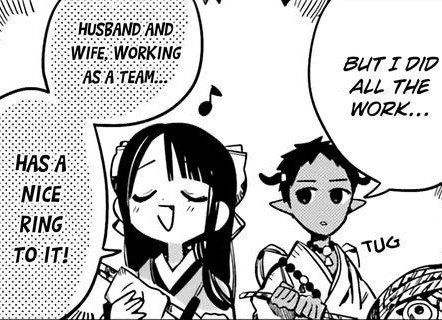
(Me, after seeing how deeply connected to the number six both Sumire and Habuko are: What the hell does this mean, Aidairo?! Come back and give me my husband-wife team!!)
Only time will tell. Who knows, maybe that’s the end and Aidairo was just messing with me. But I digress.
The purpose of Hakubo and Sumire in this manga is clear to me: not to makes us fearful and cynical for a ‘bad end’, but hopeful for a good one.
Now, whatever that would be for our characters is a whole other story.
144 notes
·
View notes
Text
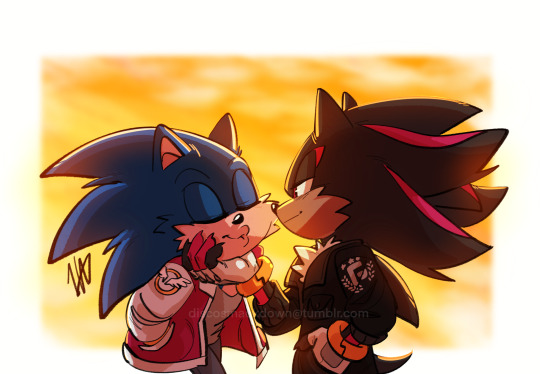
redraw of an old picture i did for a different ship in a different fandom 🫣
636 notes
·
View notes
Text
I just watched Wish (2023) and it made me realize something kind of sad about Disney’s treatment of villains.
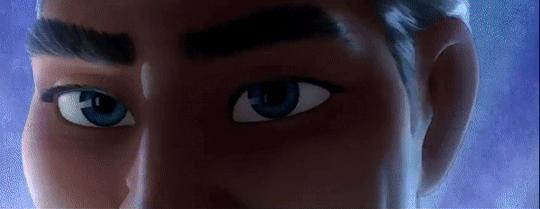
So Disney has a long history of villainy from the OG Evil Queen who is willing to murder a girl just for being pretty to the misguided like Auto thinking he’s protecting humanity in Wall-E. They are mean, jealous, prideful, vain, and many relish in just being the worst of the worst. However every now and then we get a glimpse of more complexity. Zootopia’s Bellwether dealing with years of racism and mistreatment, Gantu trying to stop what he thinks is a monster in Lilo and Stitch, Up’s Muntz being a heroic explorer before paranoia consumed him, etc. The thing that makes me sad about these villains is that not one of them has ever had a chance at redemption or change in Disney’s eyes and nowhere is that sadder to me than their latest villain, King Magnifico.
(Spoilers below)
King Magnifico is the magical founder of a utopian society that accepts people of all races, religions, and backgrounds. Who created this wonderful place after what is heavily implied to be a violent invasion destroyed his homeland when he was but a child. This past trauma led him to study magic and become a powerful sorcerer so that nothing could hurt him or the people he cared about ever again. His magic is a protection that he extends to all who choose to live in the city. The city is vibrant with a colorful community full of artisans, musicians, and dancers. He takes no taxes from them, but does take their one true wish upon joining this society.
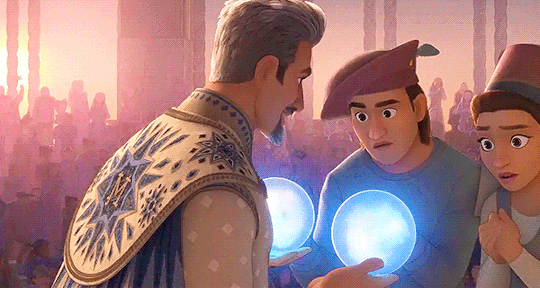
When given these wishes it is understood that he will ensure their safety and possibly grant them one day. Something important to note about the physical manifestations of the wishes is that they give off a warm and comforting aura as they represent some of the purest parts of a person’s soul. Magnifico has been surrounding himself with this magical comfort for a very very long time by himself and I don’t think it’s unfair to say he has become addicted to their presence. The wishes are giving him a magical comfort through the kind souls within them, a feeling he could’ve probably also gotten if he had spent more time with his people.
It doesn’t look like he ever really got the chance to commune with his people properly because somehow the society kicked off on his wish granting abilities. People had to give him their wishes if they wanted them granted and eventually the ones that he couldn’t grant in good conscience or out of fear started adding up so he began locking them away. Keeping them safe so no harm came to the people. The rare occasions that anyone else interacts with these wishes is during wish granting ceremonies that the people are borderline rabid for. With good reason, it is their souls they’re thirsting for after all even if they don’t really know it.
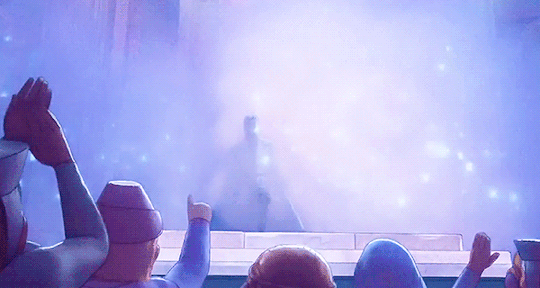
However, Magnifico clearly doesn’t see it that way. He sees it as he’s given these people a wonderful safe haven from the horrors of the outside world where they can be whoever they want to be, do what they want to do, make what they want to make, and still all they see in him is a tool to fastpass to something else they want even more than the peace he’s given them.
This is clearly shown early on, before any of his evil behavior starts to take root, in relation to his assistants. We get a expo dump after the first song telling us that Asha wants to become one of his assistant to increase the odds of her grandfather’s wish being granted as there is a correlation between past assistants and having wishes granted. Something important here is that there have clearly been many assistants, suggesting that it’s a revolving door position without really explaining why. Who would want to keep finding assistants over and over again, when really you should find someone who could do the job long term right? Well we get to find out the likely reason when Asha steps up for the role.
When Asha comes to interview for his assistant position he sees she is nervous, he tries to calm her down, and he even manages to relate to her through fond memories of her kindly father who he clearly knew. After seeing her true resolve to do good he decides to trust her with something few people in the entire kingdom get to see, the vault of wishes. To which Asha doesn’t even hesitate to ask, after politely being told not to prior, if he’ll grant her grandfather’s wish.
Magnifico is blatantly stricken by her request, sadly remarking that most people at least wait a few months before doing so a.k.a pretend to be interested in helping him rather than trying to use him to grant a wish. This is likely why the assistant job is a revolving door. Magnifico tries to find someone who he thinks will truly and selflessly fulfill the role only to discover time and again that people are just using it to get direct access to him to ask for a wish. Then he can’t trust their true intentions anymore and moves them along.
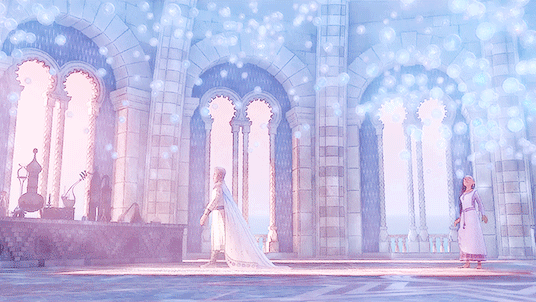
After Asha makes her request he does take the time to look at her grandfather’s wish but dismisses it as too dangerous because it is the vague desire to inspire the next generation. Clearly we as the audience know that her grandfather means to inspire them to do good, but we have to remember Magnifico has seen the worst of society. He has seen the darkest wishes and desires of mankind and survived them. He brushes Asha off telling her she’s too young to understand, which is honestly true. She’s lived her entire life cloistered in peace and comfort thanks to him and the rules he has made. She has never had to know war, strife, or hardship thanks to him, yet she doubts his decision without understanding the trauma that guides it. This is what I believe pushes Magnifico into his villain arc, something that I don’t think we’ve ever really witnessed in a Disney movie.
Usually a villain already is the villain by the time the film rolls around, even the twist villains. Lotso had already been deliberately sentencing other toys to torture. Prince Hans was already planning to murder his way to a throne. Evelyn was already plotting her revenge. Magnifico wasn’t though. He was the hero. He had saved his wife and a whole city’s worth of people from whatever drove them from the mainlands. He wasn’t physically abusing/mistreating people like Gaston even if he was vainly basking in their adoration.
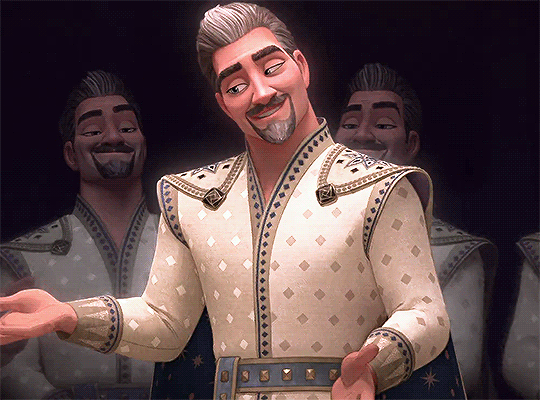
When Asha pushes him on the wishes he pulls back from her, identifying her in his mind as a threat and treats her as one. He dismisses her and tells her that her family’s wishes will never be granted by him, but he will still keep them safe as he has been doing. Essentially meaning nothing will change for her from what it has been. You know a happy loving existence of complete acceptance and wholesome family life or as Asha interprets it, a fate worse than death.
His interaction with Asha triggers him, as she’s pushed at the flaws in his reasoning for holding onto the wishes. The flaws are true, but his mind is clouded by fear of a lack of control, likely stemming from the horrors he witnessed in his childhood when he had no control. He also likely has a bit of an addiction to the warm fuzzies that the wishes give on top of his fears. While he’s ruminating on that some massive wave of magic blows through the kingdom and messes with the thing he’s already stressed beyond reason about, the wishes.
Magnifico frantically searches for any answer, even considering a dangerous tome of forbidden magic that he knows is trouble before his wife manages to talk him down.
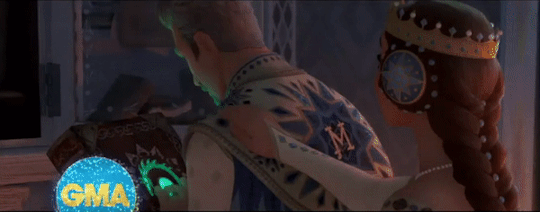
The fact that he could even be talked down rather than ignoring her outright shows that Magnifico does have good in him. He’s just reacting out of a genuine panic. His panic is only worsened by huge mob continuing to beg him for wishes in exchange for doing what should be the selfless act of defending their kingdom from what is essentially perceived as an attack. Not having any faith left in his people he turns back to the evil book to give him the key to stopping this perceived attack.
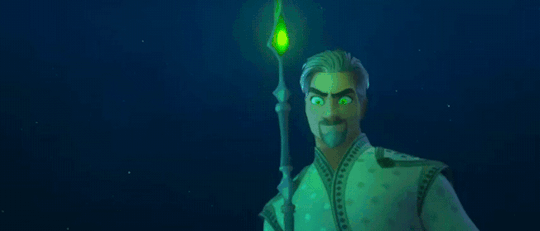
Just to be clear King Magnifico goes to the big bad evil book not to gain more power for funsies, but to try to find a way to stop a perceived threat. Everything he does from this point on, such as threatening his wife, can no longer be fairly tied to him, because as the movie repeatedly tells us he is under the EVIL book’s influence. His wife even looks through the same book to try and see if there is a way to break the sway she knows it has over him, but says she can’t because the EVIL book said no.
Yada yada yada and Magnifico is sealed inside a magic mirror and smugly told to rot in the dungeon by his previously loving wife.
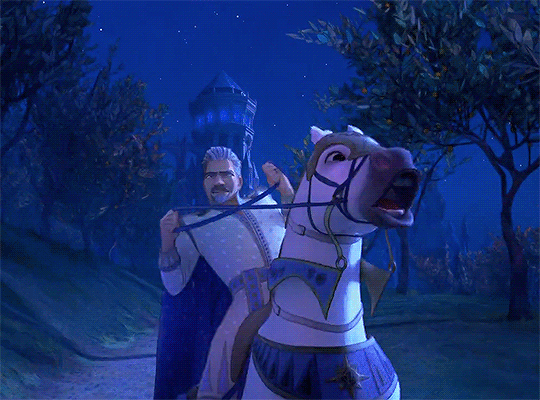
Seriously?! What the heck?! This guy was the perfect candidate for rehabilitation. He wasn’t flawless, but he wasn’t a murderous psycho like most of the other Disney villains. Disney loves to preach kindness, acceptance, and good will with their heroes, but never does it allow the message of change.
I was shocked going back through the catalogue and slowly realizing none of their villains, regardless of how tragic their origins are, are ever truly allowed a second chance. The hero may offer it, but the baddy never is truly expected to change or reform. Which is honestly super messed up to me. People make mistakes. Some can be small/insignificant, but some are big and do hurt people sometimes. That doesn’t mean they can’t change for the better.
Now I’m not saying every villain is redeemable or good, it’s just a bit surprising that for all the messages of kindness and acceptance we haven’t really gotten forgiveness in 100 years. Seeing the “bad guy’s punishment” just deeply bothered me this time. Probably because so much of the bad that Magnifico does is clearly a trauma response and as a punishment for not acting appropriately to said response he gets sentenced to eternity is magical cell.
786 notes
·
View notes
Text
WE WERE ROBBED 😭😭😭😭😭😭
youtube
In the "Making of Wish" documentary, they stated that they cut out this scene and Star Boy mainly because Star Boy was apparently "too similar to other Disney characters" and that they wanted Asha to "solve her own problems by herself without anyone's help"
This is so hypocritical... Asha in the final film was literally just an amalgamation of the "Adorkable" Disney princess character trait and....THEY ACCEPTED THAT THEY WENT "WOKE"
In the movie, Asha ends up taking help from others anyway so it wasn't about "help", it was more about removing Star Boy and Asha's romantic chemistry. This 5 minute clip gave me more feels and actual goosebumps than the final Wish movie.... This is further proven as to why we didn't get the evil royal power couple 😭 They couldn't display romance actively if at all in woke culture and God Forbid, a female being evil and being deeply in love with her husband?!
They knew they can't keep the royal duo evil because then their agenda would die out
The "It just wasn't working" was a total excuse and a lie.
Seriously there's this another scene with evil Amaya and Magnifico and...They are threatening and elegant af AND THE CHEMISTRY WAS JUST 😭😭😭😭
youtube
We were robbed man....we were robbed....
257 notes
·
View notes
Text
C H I L L I N G
HE SAYS, WHERE HAVE YOU GOOOOONE
OR HAVE YOU BEEN THERE YEEEEEET
WHERE THE MIND WINDS DOOOWN
CHILLING THE REGREEEEEEEEEETS
44 notes
·
View notes
Text
HE SAYS, WHERE HAVE YOU GOOOOONE
OR HAVE YOU BEEN THERE YEEEEEET
WHERE THE MIND WINDS DOOOWN
CHILLING THE REGREEEEEEEEEETS
44 notes
·
View notes
Text
hot artists don't gatekeep
I've been resource gathering for YEARS so now I am going to share my dragons hoard
Floorplanner. Design and furnish a house for you to use for having a consistent background in your comic or anything! Free, you need an account, easy to use, and you can save multiple houses.
Comparing Heights. Input the heights of characters to see what the different is between them. Great for keeping consistency. Free.
Magma. Draw online with friends in real time. Great for practice or hanging out. Free, paid plan available, account preferred.
Smithsonian Open Access. Loads of free images. Free.
SketchDaily. Lots of pose references, massive library, is set on a timer so you can practice quick figure drawing. Free.
SculptGL. A sculpting tool which I am yet to master, but you should be able to make whatever 3d object you like with it. free.
Pexels. Free stock images. And the search engine is actually pretty good at pulling up what you want.
Figurosity. Great pose references, diverse body types, lots of "how to draw" videos directly on the site, the models are 3d and you can rotate the angle, but you can't make custom poses or edit body proportions. Free, account option, paid plans available.
Line of Action. More drawing references, this one also has a focus on expressions, hands/feet, animals, landscapes. Free.
Animal Photo. You pose a 3d skull model and select an animal species, and they give you a bunch of photo references for that animal at that angle. Super handy. Free.
Height Weight Chart. You ever see an OC listed as having a certain weight but then they look Wildly different than the number suggests? Well here's a site to avoid that! It shows real people at different weights and heights to give you a better idea of what these abstract numbers all look like. Free to use.
194K notes
·
View notes
